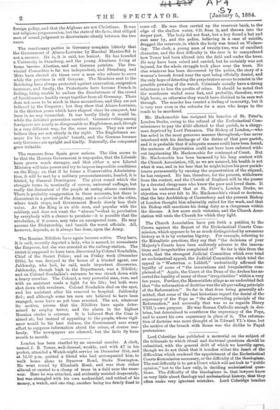The Church Association have put forth a petition to the
Crown against the Report of the Ecclesiastical Courts Com- mission, which appears to be as much distinguished by erroneous history as it is by sectarian bigotry. For example, referring to the Ritualistic practices, they say that "the decisions of your Majesty's Courts have been uniformly adverse to the innova- tions and irregularities complained of." So far is this from the truth, that the strongest Judicial Committee which ever tried an ecclesiastical appeal, the Judicial Committee which tried the appeal in " Westerton v. Liddell," undoubtedly affirmed the legality of some of " the innovations and irregularities com- plained of." Again, the Court of the Dean of the Arches has as- sertedthe legality of many of these "irregularities" within a very few years. Further, the Memorialists allege as an undoubted fact that "the reformation of doctrine was the all-pervading principle of the Reformation." So far is that from being generally ad- mitted, that some of the best historians regard the denial of the supremacy of the Pope as " the all-pervading principle of the Reformation," and assuredly that was so as regards Henry V111.'s own purpose. He was Roman Catholic enough in doc- trine, but determined to overthrow the supremacy of the Pope, and to assert his own supremacy in place of it. The reforma- tion of doctrine was more thought of in Edward VI.'s time, but the motive of the breach with Rome was the dislike to Papal pretensions.






































 Previous page
Previous page